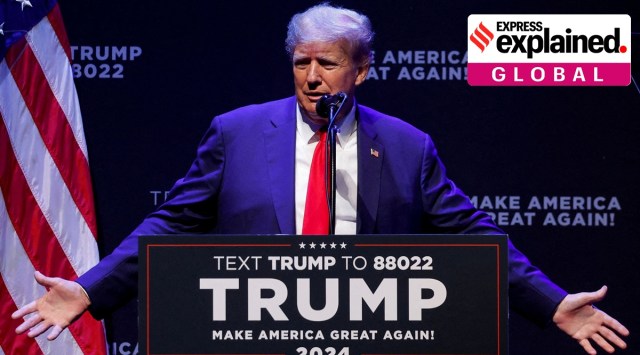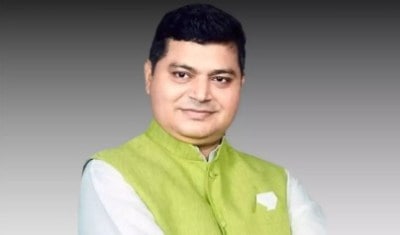Why Donald Trump faces arrest, and the probable charges against him
Donald Trump could be indicted or formally charged for covering up payments discreetly made to porn actress Stormy Daniels during his 2016 presidential campaign.
 Former US President Donald Trump delivers remarks on education as he holds a campaign rally with supporters, in Davenport, Iowa, US on March 13, 2023. (Reuters/Jonathan Ernst)
Former US President Donald Trump delivers remarks on education as he holds a campaign rally with supporters, in Davenport, Iowa, US on March 13, 2023. (Reuters/Jonathan Ernst)Former US president Donald Trump could be indicted by a New York grand jury as early as Wednesday for allegedly covering up hush money payments to porn actress Stormy Daniels during his 2016 presidential campaign. According to media reports, the grand jury has been hearing evidence in connection to the case for weeks, including the testimony of key witness Michael Cohen, who allegedly made the payments to Daniels. Trump has so far denied all the allegations, claiming he was a victim of extortion.
On March 18, the former president called upon his supporters to stage protests, saying he “expects” to be arrested on Tuesday. “Illegal leaks from a corrupt and highly political Manhattan district attorney’s office … indicate that, with no crime being able to be proven … the far and away leading Republican candidate and former president of the United States of America, will be arrested on Tuesday of next week,” Trump wrote on social media platform Truth Social. He is yet to be arrested by the authorities.
What is the current case status?
Under New York law, a person expecting an indictment can request a witness to appear on his behalf. The final decision to hear the witness rests with the grand jury. In light of this, Robert J. Costello, who was once a legal adviser to Michael Cohen, appeared before a Manhattan grand jury on Monday, at the request of Trump’s lawyers. Costello provided testimony attacking the credibility of the prosecution witness, while adding, “I told the grand jury that this guy couldn’t tell the truth if you put a gun to his head,” The New York Times reported.
Why is Trump facing arrest?
Trump could be indicted or formally charged for covering up payments discreetly made to Daniels during his 2016 presidential campaign. According to Reuters, Manhattan District Attorney Alvin Bragg presented evidence to the grand jury about a $130,000 payment to Daniels in exchange for her silence about a sexual encounter with Trump in 2006.
A BBC report states that once the investigation is complete, the grand jury votes on criminal charges. But first, the Manhattan District Attorney will decide if charges are to be brought in. If a criminal case is initiated, this would be a first against a former US president. However, the next steps for the grand jury remain unclear.
Moreover, the New York case is one of the several cases pending against Trump. Others include the Georgia Election interference probe, federal investigations into his role in the storming of the US Capitol in 2021, and the retention of classified documents after he left the White House.
What are the possible charges against Trump?
* In 2018, Cohen was arrested by the FBI following raids at his home and office. After this, he pleaded guilty in Manhattan Federal Court to eight counts, including criminal tax evasion and campaign finance violations. According to a 2018 federal court filing in Cohen’s case, it was revealed that Trump had concealed the purpose of the “hush” payments made to Cohen by falsely stating they were for a legal retainer that did not exist.
In the present case, Trump could be charged with falsifying business records under Article 175 of the New York Penal Law. A conviction for the felony of bookkeeping fraud involves a sentence of up to four years. However, to prove this, prosecutors require evidence showing Trump caused his subordinates to make false entries in the company record, “with intent to defraud.” For the action to be a felony rather than a misdemeanour, the intention of committing, aiding, or concealing a “second crime” needs to be brought out.
The NYT has also reported that the DA’s office is considering invoking the campaign funding violations against him as the intended “second crime”.
* Special counsel for the federal Justice Department, Jack Smith, is investigating matters related to “several hundred documents marked as classified” that Trump kept at his Florida club and home, despite leaving office. Moreover, he also resisted efforts by the Justice Department to turn them over, submitting only a few despite a court order. In August 2022, the FBI issued a search warrant and found 103 more documents in Trump’s possession.
For this, Trump could face charges of unauthorized retention of national security documents. The FBI’s affidavit for searching Trump’s home also stated Section 793(e) of Title 18 of the Espionage Act as a charge against him, which pertains to “gathering, transmitting or losing defence information”. The stipulated punishment for this is up to 10 years per each classified document. But the prosecution must prove that Trump possessed the documents after leaving the White House and failed to comply when asked to return them. The documents should also relate to national defence and their disclosure should possibly harm the US or aid a foreign adversary.
* Following the storming of the Capitol on January 6, 2021, a committee was constituted, which accused Trump of attempted obstruction of an official proceeding under Section 1512 (C) of Title 18, which is punishable with up to 20 years imprisonment. The same law has been used to charge 300 other rioters who participated in the storming of the Capitol. However, in Trump’s case, the situation is complicated since he did not physically participate in the riot himself.
The committee also referred to Section 2383 of Title 18, which criminalizes incitement, assistance, or aiding an insurrection against the authority and laws of the federal government, and said that Trump’s refusal to call off the rioters for hours corroborated this.
* The District Attorney for Fulton County, Georgia is investigating events relating to the 2020 Georgia state elections, where Trump attempted to “flip” President Joe Biden’s victory, as evidenced by a leaked phone call between Trump and Georgia’s secretary of state, Brad Raffensperger.
Although, in the 2021 Georgia Code, most election violations are considered misdemeanours, there are still some charges which can be levelled against Trump, including Section 21-2-603, which criminalizes conspiring with another person to violate the provisions of the election code, and Section 21-2-604, which makes it a crime to make another person commit election fraud.
- 01
- 02
- 03
- 04
- 05






































